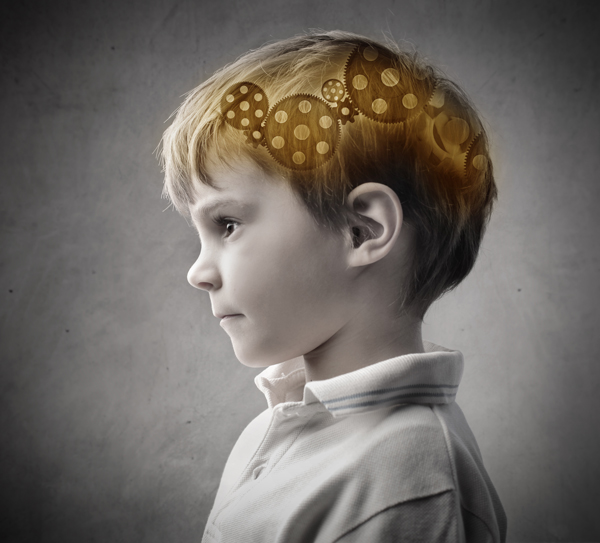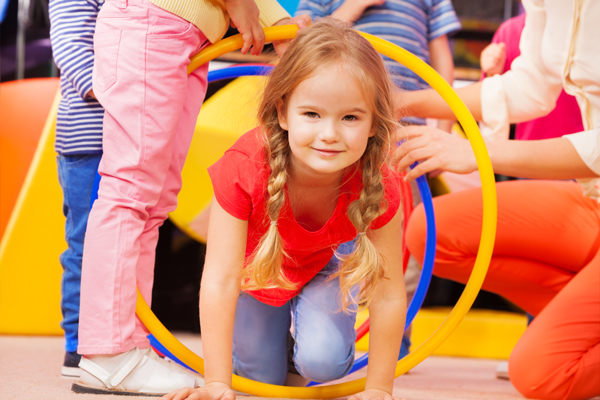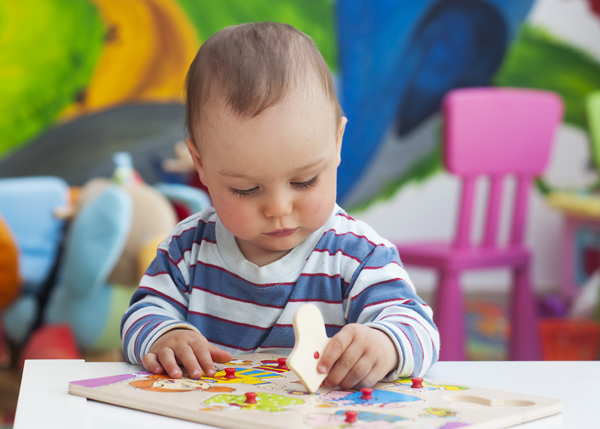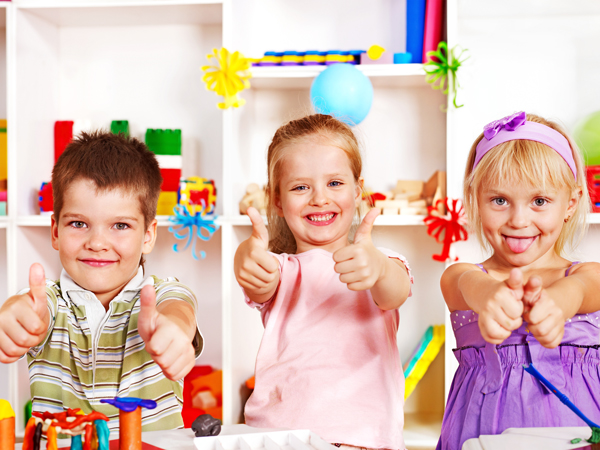Join the thousands of parents already raising smarter, happier babies with our online baby classes: The Active Babies Smart Kids series. Click here.
GymbaROO-KindyROO kids are excelling academically, emotionally, in leadership roles and on the sporting field. Find us at: GymbaROO-KindyROO
Dr Robyn Floyd
The early experiences of a child’s life have a profound and lasting impact on the developing brain. Environments and experiences in the first three years of life contribute to either a strong or a fragile foundation for future learning1.
Quality play and rich learning environments
The key message that can be gleaned from recent neuro-science research is that the first years of a child’s learning matters! Children’s senses report information to the brain about their experiences, and this input stimulates neural activity. Researchers confirm that quality play and rich learning environments impact on brain development allowing children to acquire and advance physical, social, emotional and cognitive skills as well as shaping the neural networks for language, reasoning, memory, problem solving and moral values. The Institute of Education tracked 3,000 students from 1997 and found that the quality of learning during a child’s early years had a strong and measurable impact on secondary school achievement2. For children’s brains to become developed, learning needs to be repetitive as this enables neural connections to become stronger and more efficient. When your child learns something, new synapses form or old synapses are strengthened, creating a memory of the experience or learning. Just like a muscle, the more memory is used in the early years, the easier it will be to handle information in school. Structured and unstructured play should include a range of physical activities, cognitive learning experiences including language, creative and imaginative play, as well as opportunities to develop social skills in a safe and secure environment.
For children’s brains to become developed, learning needs to be repetitive as this enables neural connections to become stronger and more efficient. When your child learns something, new synapses form or old synapses are strengthened, creating a memory of the experience or learning. Just like a muscle, the more memory is used in the early years, the easier it will be to handle information in school. Structured and unstructured play should include a range of physical activities, cognitive learning experiences including language, creative and imaginative play, as well as opportunities to develop social skills in a safe and secure environment.
It is also important that rich language is incorporated into all activities to create the foundation for a child’s use and understanding of words. Research shows that the richness of a young child’s verbal interactions has an effect on vocabulary and school readiness.
What kinds of activities nurture brain development?
Sensory and movement programs that provide sensorimotor activities from birth enhance large muscle development, spatial awareness, balance and hand-eye/foot-eye coordination alongside the development of sensory integration skills. Gross and fine motor skills are necessary for many later life tasks, from writing to athletic skills. Sensory integration enables a child’s brain to sort out key sensory messages and respond quickly and appropriately without distraction.
Cognitive activities develop growth in thinking, reasoning, memory, concentration and understanding. Solving jigsaw puzzles and building patterns with blocks and construction activities give children the opportunity to develop problem solving skills and when playing with others, social interaction. Nurturing creativity and imagination through art, craft and drama aids the development of abstract thinking and problem-solving skills.
Music and movement experiences enable children to develop rhythm, beat, singing and to express themselves through different types of music. Many studies suggest that music benefits the growing brain by developing spatial-temporal reasoning (the ability to see part/whole relationships), promoting language acquisition, listening skills, memory and motor skills. Musical experiences integrate different skills simultaneously, thereby developing multiple brain connections.
Outdoor play should include a variety of physical, fine motor and social activities set up for children to allow them to develop their coordination skills and their large and small muscle strength as well as language and social skills. Activities could include water and sand play, use of climbing equipment and art, craft and construction activities set up outside.
Choosing childcare that fosters neuro-development
When you are choosing a childcare centre, it is important to evaluate not just the facilities, staffing arrangements, policies and processes, but also the type of learning programs provided for each age group. Make sure you ask questions, check out the centre website or visit more than once. You need to look beyond the external features of the centre and glossy brochures and observe what is happening around you.
Think about your child’s needs before you begin your search
- Does the structure of the day offer your child time to explore as well as learn new things in thoughtfully structured activities?
- How best will your child’s development, including their social, emotional, physical and cognitive needs be met?
- What information about your child’s needs and interests do you need to share with the centre that will support your child’s transition?
What should you look for?
First impressions do count. How do you feel when you walk in? Is it warm and inviting? Do staff members speak to your child/baby as well as explaining their processes and procedures to you? Observe the way staff play and talk with children, not just in the areas you are being shown, but also in the outdoor areas and in one-to-one situations. Educators should be engaged with children, playing and talking with them and asking questions. It is important that your child’s caregivers are warm and responsive and that even within group care, infants and older children have the opportunity for one-on-one time.
Other questions you may choose to ask
- How is the day structured? This should include neuro-developmental play with age-appropriate toys and learning activities as well as quiet activities, or sleep time.
- How do current theories about learning and brain development influence the program?
- Are the adults attentive to children’s needs and learning interests?
- Is there exposure to rich, interactive language in all areas of learning?
- How does outside play equipment accommodate different abilities?
- Are there theme days that engage children such as Green Colour Day or celebrations of cultural events?
- What extra programs are offered? Is there an extra fee involved?
- GymbaROO sensorimotor program
- Music experiences
- STEM (Science, Technology, Engineering, Mathematics)
- Languages program i.e. Mandarin, Auslan
- Incursions e.g. a petting zoo visit
Learning begins from birth and high quality early education and care makes a significant and positive impact on the learning, development and well-being of children, in their daily lives and their future school and life experiences 3. As it is now generally accepted that both nature and nurture are responsible for children’s brain growth, function and capacities, it makes sense to choose environments that offer experiences that will enhance the potential of your child. Dr Robyn Floyd (PhD, MEd, Spec. Cert. Leadership in Assessment): Assistant Principal – Specialist Curriculum Writer
Dr Robyn Floyd (PhD, MEd, Spec. Cert. Leadership in Assessment): Assistant Principal – Specialist Curriculum Writer
References: 1. How brains are built: http://www.rch.org.au/ccch/publications-resources/chd/Children_s_health_and_development_-_September_2014/#Brains 2. Taggart, B., Sylva, K., Melhuish, E., Sammons, P., & Siraj, I. https://www.gov.uk/government/uploads/system/uploads/attachment_data/file/455670/RB455_Effective_pre-school_primary_and_secondary_education_project.pdf.pdf 3. Nutbrown, C. (2012) Foundations for Quality: https://www.gov.uk/government/uploads/system/uploads/attachment_data/file/175463/Nutbrown-Review.pdf
GymbaROO-KindyROO
Thousands of parents, babies and children are presently involved in our programs and creating rising stars. GymbaROO-KindyROO kids are excelling academically, emotionally, in leadership roles and on the sporting field. Come join all the fun and learning! “GymbaROO – The best decision I ever made for my child.” Classes from 6 weeks old – 7 years GymbaROO KindyROO
Active Babies Smart Kids – Online Baby Classes
GymbaROO-KindyROO’s online series of baby classes is taking the parenting world by storm! It is highly recommended by doctors, paediatricians, early childhood experts and the Maternal Child and Family Health Nurses Association. This series is being called: “The essential guide for parents”. Join the thousands of parents already playing with their babies from birth, in the best way for brain and body development and laying crucial foundations for future learning. What happens in the first year, not only matters, it matters a lot!
Active Babies Smart Kids online series – Click here.
Try the first class FREE! Click here to watch our Active Babies Smart Kids Episode 1 – Tummy Time
Enjoy the following GymbaROO-KindyROO articles
To my elected childcare, preschool or school: Please include a GymbaROO sensory-motor program.
GymbaROO and KindyROO: Who, what, where, why and how.
Kids learning ability jumps 2 years with 25 minute GymbaROO movement program 3x a week.
NAPLAN results improve with LESS reading and maths and MORE GymbaROO.
GymbaROO sensorimotor programs in childcare centres in Canberra.
Why GymbaROO kids excel at sport.
Why GymbaROO Kids excel academically.
Why GymbaROO kids excel at the three R’s – wRiting, Reading, aRithmetic (maths).
Why GymbaROO kids excel socially and in leadership roles.
Finger Painting – A brilliant activity for babies and toddlers.
The skills needed for writing begin in infancy. What parents can do.
When will my baby / toddler become right or left handed?
Important reasons to teach your baby / child to ‘keep the beat’
Supercharge your child’s brain development with music. Latest research. Dr A.Collins
Teaching music during the earliest years produces long-lasting changes in the brain.
Click here for more GymbaROO and BabyROO article choices.

